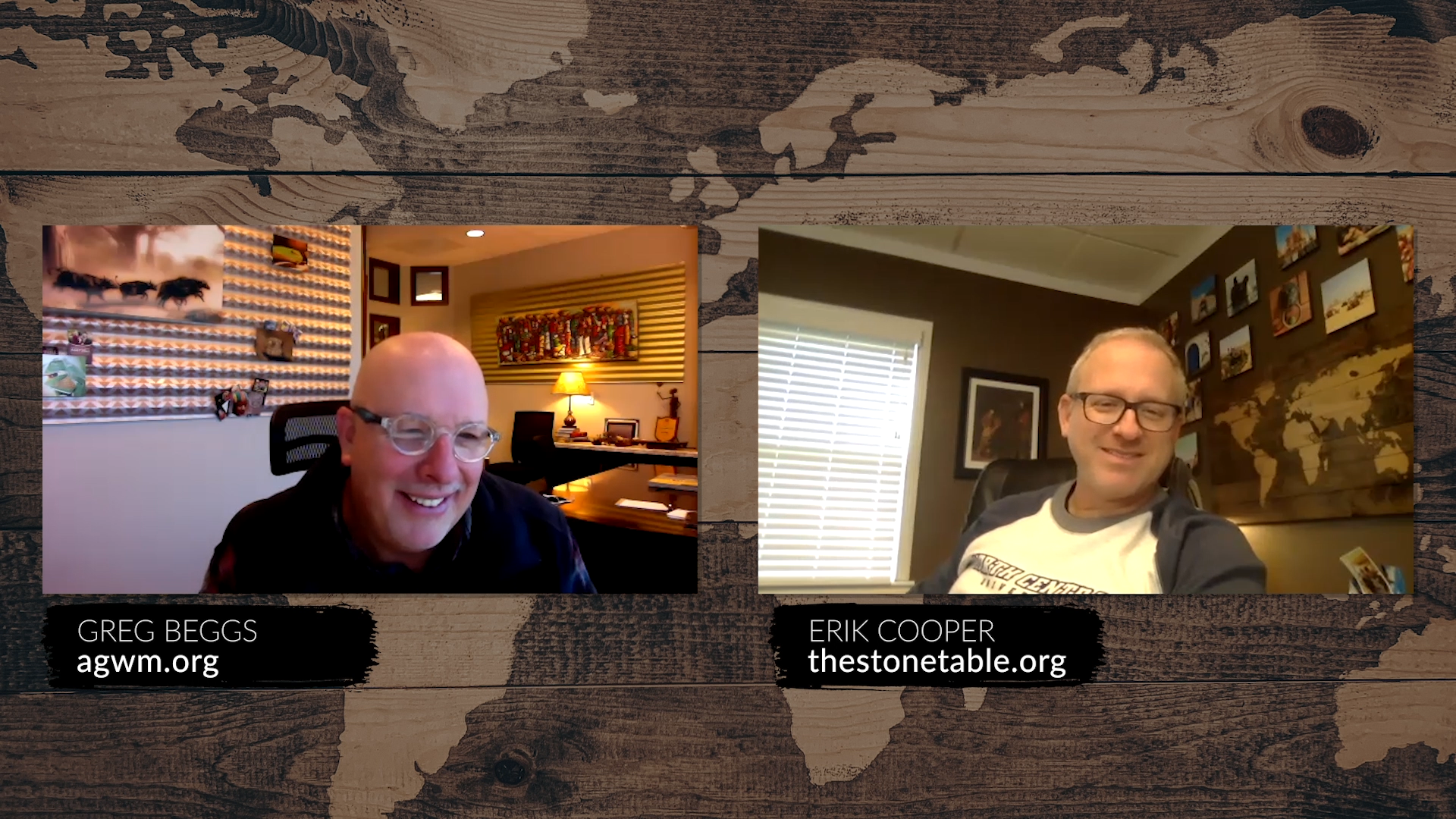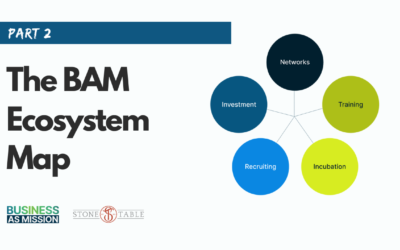VIDEO: Interview with Greg Beggs, of Assemblies of God World Missions (AGWM)

Using Business as missions (BAM), gives us the ability to reach unreached people groups
To put it simply: Business gives us access
Thanks to Greg Beggs with Assemblies of God World Missions (AGWM) for reminding us to pursue others with our business
Check out www.agwm.org for more information
Follow The Stone Table
Instagram:@thestonetable_org
Facebook: The Stone Table
Youtube: The Stone Table
Transcript
So really, I mean, first I mean, can you just tell us a little bit about, I guess yourself, your role with Assemblies of God, world missions (AGWM), kind of where you started and where you’re at now? Yeah, sure.
I actually grew up in Africa, so I went to Africa when I was a little kid. I guess I was about three years old when I first got there and stayed there all the way through high school, which country and back to the states. What’s that? Which country? Tanzania. Kenya. So I’m pretty comfortable in that world, so that’s kind of my background. So when I get to go back to Africa frequently, it’s comfortable for me.
So you grew up kind of in that situation where all of us kids, we were always worried that we were going to get called to Africa. Let’s go live in a hut, right. Yeah. Was minus the hut. That was actually your experience, right? Yeah.
Actually, Africa for a kid back in those days was amazing. I grew up in a little village, literally a little village. My dad was teaching at a Bible school. He was principal Bible school kind of out in the bush outside of a town called Tanzania. Just just I delic. I mean, little African, beautiful little African village, had a lot of African friends I played with every day. You know, I was the only kid around with a like a red a red ride your bike ride a bike and and a little red wagon.
And so those were the toys of the village where we had a blast. It was good stuff.
So you grew up on the field and then you ended up with your own call, related to missions. Right.
And yeah, you know, I think part of those early years begin to shape my understanding of Africa and kind of what missions are. Yeah. And so out of that group called them grew and matured through my life. And then the Lord was gracious enough. To allow us to go back to the field we worked in again, we worked in Tanzania initially for about 13 years, and we were in Kenya for about 13 years. So twenty six years on the field.
And then and then they asked us to come to the states to do what we’re doing now, which is basically giving oversight to our missionaries who live on the continent and work in Africa.
So you’re the regional director over Africa for AGWM. So how many missionaries do you oversee?
Well, we probably have, you know, depending on how many emails or maps, workers, things like that, we have around three hundred and fifty, something like that in your region.
Yes. So, I mean, AGWM has been around for 100 years, right?
I mean, yes. You know, just probably one of the largest and most well respected missions organizations in the world.
I mean, why why do you think that is? Why do you think AGWM has really had the impact that it’s had over the last century now? Well, you know, that’s a very good question, Erica. I think a large part of it really is the Holy Spirit has been very, very gracious to us as a mission, as an organization, as a fellowship to the Assemblies of God. And then there were some early people. There were some people early on, I should say, a lady by the name of Alice Luce.
Who begin to understand this whole thing of the indigenous church and begin to understand that it’s important for us to not only plant the church on foreign soil, but then to enable that church to become functional within its own context so that it flourishes within its own soil there. And she began to to preach that in our circles and it began to catch on. Yeah.
And so at a time when colonialism was at its height, at a time when foreign regimes were running places like Africa, literally, I mean, you know, it was being colonized right and left the Holy Spirit. Helped us as the Assemblies of God to not go in there and to plant an American church, but somehow to plant an indigenous church that became African or Latin American or or, you know, what are Chinese. And so from that, I believe the church just flourished.
So I think that’s part of the reason that God’s been so gracious and the churches have flourished and grown so much overseas in the Assemblies of God.
So that would be a key part, I guess, of what you would consider AGWM and this is the indigenous church. So, I mean, if you were to describe the kind of physiology that you guys use, you know, an AGWM at large, but what you use in Africa, I mean, how would you define that? I mean, is that a huge part of it?
Oh, that absolutely. I mean, it’s very basically it’s the three self. So we say the indigenous church would be a church that is self-governing. That means it has its own leadership. So it would be a church that is self supporting. That means it relies on Jesus for its own funding. And in other words, they believe in tithes and offerings and they’re not relying on people like Americans to take care of them and then and then self-propagating, which means they reproduce themselves through the power of the Holy Spirit.
So they plant their own churches. They do their own witnessing. They’re not relying on any sort of outside sources to grow and reproduce themselves. So those are the very kind of basic things of what the indigenous church is.
And I know you guys are working in all kinds of places, all kinds of countries, but I know there is a huge push towards unreached people groups of the world upgrades, 10, 40 window, I guess, whatever we want to call it. Right. But it has that always been part of the heartbeat of Assemblies of God world missions (AGWM) as well?
I think so.
I mean, I think back to the very beginning, you know, some of the older documents talk about seeking out the unengaged places.
And I think, you know, it’s not only been sort of our DNA, but I think it’s somewhat of biblical DNA.
I mean, I think and I think, you know, even Paul talked about not wanting to build on others foundations. And and, you know, there’s a nuance and, you know, there’s a messy, illogical.
But you have to maneuver your relationships with churches that you’ve planted in positive ways. You don’t abandon them, but at the same time, you partner with them to go to new places. And I think I think Pentecostal people will always be looking for the frontiers of lostness. I think the spirit of God will always be driving us to places where people still do not know Jesus, to places where they still do not have an adequate witness. We will never be satisfied to stay in places that are Christianized.
And that’s I think that’s just who we are as gospel believers. Yeah, it’s interesting. I mean, my first real encounter with I mean, obviously we’ve been working funding missions, projects and things like that to reach places. But it was actually in Tanzania. I was with David Whitington and Niks Duva. They were taking me out to Lacasse with Gillham Dolfi, which was an experience for me, I tell people it is one of the most meaningful nights of my life that I never want to experience again.
That’s what I do. So I told people about it because he was a bit overwhelming for me. But we actually on our way out there, we kind of crested this hill. It’s time for us to take a break on the four hour drive. And there was a woman walking. She was carrying a little baby and the baby was sick and they got out and Gil and Nick were kind of interacting with her. And in that process, she told us she was taking the baby to the witchdoctor in the next town because the baby was sick.
And so they started talking to her about the gospel. They started talking to her about Jesus. And at one point, through the translator, Gill had said to her, We would love to introduce you to Jesus, I think was the way the translation came through. And her eyes, they just got big. And she said.



